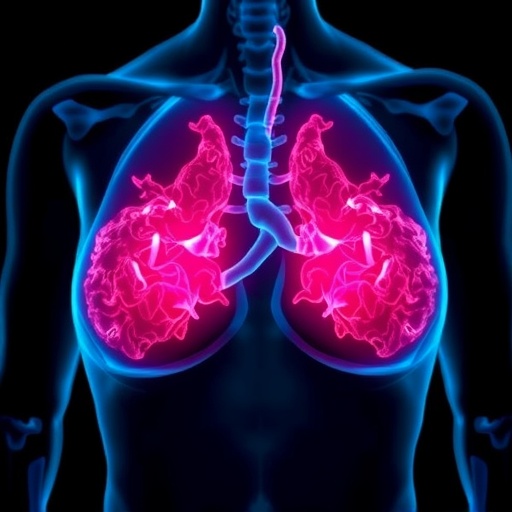In a groundbreaking revelation that could reshape therapeutic approaches to early breast cancer, the NeoRHEA phase 2 study unveils critical insights into the interplay between palbociclib, endocrine therapy, and the body’s adaptive immune response. This pivotal research, conducted by Papagiannis, Majjaj, Duhoux, and colleagues, reveals that the combined treatment regimen significantly diminishes anti-tumor immunity, a finding that may have profound implications for oncological treatment paradigms moving forward.
Palbociclib, a cyclin-dependent kinase 4/6 (CDK4/6) inhibitor, has been heralded for its ability to halt cell cycle progression, effectively suppressing tumor proliferation in hormone receptor-positive breast cancer. When paired with endocrine therapy, which targets hormone-driven tumor growth, this combination forms a cornerstone of current treatment standards for early breast cancer. However, the NeoRHEA trial’s results suggest a more complex biological narrative, wherein these therapies may inadvertently suppress the immune system’s ability to combat cancer cells.
The adaptive immune system, comprised primarily of T and B lymphocytes, plays an integral role in recognizing and eliminating malignant cells. It serves as the body’s precision-guided missile system, adapting and responding dynamically to the evolving landscape of cancer antigens. The NeoRHEA study meticulously analyzed the immune landscape before and after treatment, revealing a notable decline in the activity and abundance of tumor-specific cytotoxic T cells following the administration of palbociclib and endocrine therapy.
Mechanistically, the immunosuppressive effect observed may be linked to palbociclib’s impact on the cell cycle of proliferating immune cells. Since CDK4/6 pathways regulate not only cancer cell division but also lymphocyte expansion, the drug’s inhibitory action can unintentionally dampen immune cell proliferation. Additionally, endocrine therapy’s modulation of estrogen signaling might further alter immune cell functionality and cytokine profiles, contributing to a less hostile environment for residual tumor cells.
The ramifications of these findings extend beyond academic curiosity, raising pressing questions about the long-term efficacy of current standard-of-care regimens. If the immune system, particularly the adaptive arm, is compromised, the patient’s ability to maintain immunological surveillance and respond to microscopic residual disease may be reduced. This scenario could potentially lead to higher recurrence rates or diminished responses to subsequent immunotherapies.
The NeoRHEA phase 2 study deployed advanced immunophenotyping and functional assays on tumor biopsies and peripheral blood samples from patients undergoing the combined treatment. These robust methodologies allowed for unprecedented resolution in mapping immune cell dynamics in real-time. Such detailed immune profiling is critical in unveiling treatment-induced alterations that would otherwise remain obscure in clinical outcome-focused studies.
Intriguingly, the study also hints at differential immunomodulatory effects depending on the timing and sequencing of therapies. Early initiation of palbociclib alongside endocrine agents seemed to exert the most pronounced suppression on effector T cell populations. This temporal aspect opens avenues for potential treatment optimization, including staggered or intermittent dosing schedules designed to preserve immune competence while maintaining antitumor efficacy.
Furthermore, the NeoRHEA findings underscore the complexity of tumor-host interactions and the necessity for integrative therapeutic strategies. The immune system cannot be viewed in isolation but rather as a dynamic partner in cancer control. As such, emerging treatment regimens might need to incorporate immune-supportive measures or agents that can mitigate the unintended immunosuppressive effects of cytostatic drugs.
Current clinical trials exploring the combination of CDK4/6 inhibitors with immune checkpoint inhibitors may need to reconsider their design in light of these results. If palbociclib dampens T cell activity, its concurrent use with immunotherapeutics that rely on robust cellular immunity might yield suboptimal outcomes. Future trials could explore dose adjustments or sequential therapy strategies to enhance synergy between targeted therapy and immunotherapy.
The NeoRHEA study also serves as a compelling call to action for the oncology research community to delve deeper into the immunological consequences of non-traditional immune modulators. While chemotherapy and radiotherapy have well-established immunosuppressive profiles, targeted therapies are only now being recognized for their nuanced immune interactions, necessitating a more comprehensive approach to therapeutic development.
Moreover, the implications of these findings are particularly pertinent in the context of personalized medicine. Biomarkers predicting which patients are most vulnerable to adaptive immune suppression during palbociclib and endocrine treatment could inform treatment selection and tailoring. This approach aligns with the broader shift towards precision oncology, where the molecular and immunological landscape of the tumor dictates therapy.
In conclusion, the NeoRHEA phase 2 study introduces a paradigm shift in understanding early breast cancer treatment dynamics. It highlights a paradox where therapies aimed at slowing tumor growth may simultaneously undermine the body’s own immune defenses—a revelation that challenges oncologists to rethink therapeutic strategies. Balancing anti-proliferative efficacy with preservation of immune function will be essential in the quest to improve long-term patient outcomes.
As this landscape evolves, novel combination regimens integrating immune potentiators or immune-sparing alternatives to palbociclib might emerge. Ongoing research inspired by the NeoRHEA findings will undoubtedly lead to more nuanced treatment protocols, potentially involving intermittent dosing or pairing with immunomodulatory agents to restore adaptive immunity.
The study’s insights pave the way for a new era where immune monitoring becomes integral to cancer therapy management. Incorporating routine immune profiling in clinical practice could help detect immunosuppression early, guiding timely interventions that sustain immune vigilance against cancer resurgence.
Ultimately, the NeoRHEA phase 2 trial exemplifies the power of translational research in uncovering hidden complexities within established treatments. By shedding light on the unintended immunological consequences of palbociclib and endocrine therapy, it emphasizes the imperative for a holistic approach to cancer care—one that harmonizes cytostatic control with immune empowerment.
Subject of Research:
Early breast cancer, palbociclib and endocrine therapy combination effects on adaptive anti-tumor immunity.
Article Title:
Palbociclib and endocrine therapy diminish adaptive anti-tumor immunity in early breast cancer: The NeoRHEA phase 2 study.
Article References:
Papagiannis, A., Majjaj, S., Duhoux, F.P. et al. Palbociclib and endocrine therapy diminish adaptive anti-tumor immunity in early breast cancer: The NeoRHEA phase 2 study. Nat Commun (2025). https://doi.org/10.1038/s41467-025-66590-2
Image Credits: AI Generated




